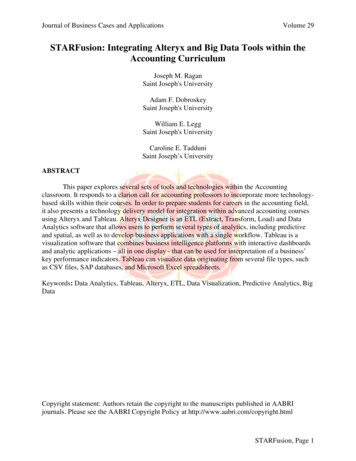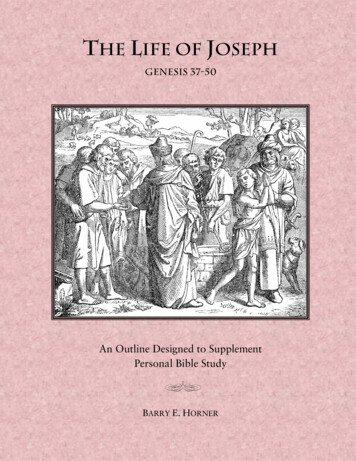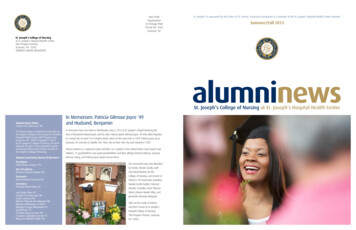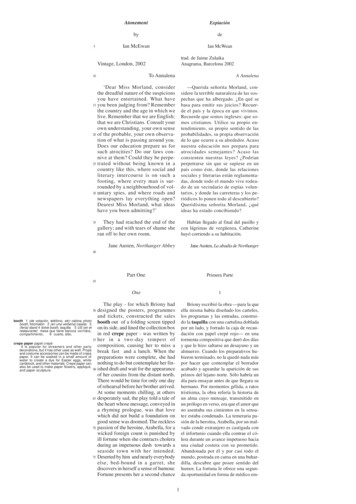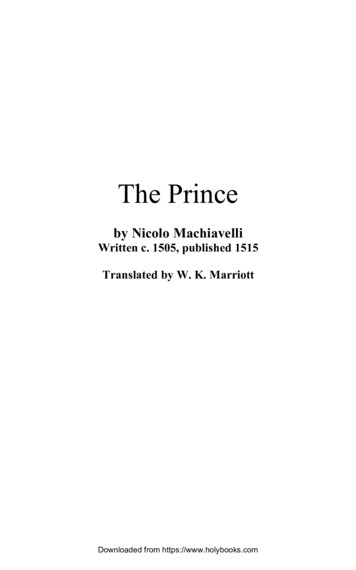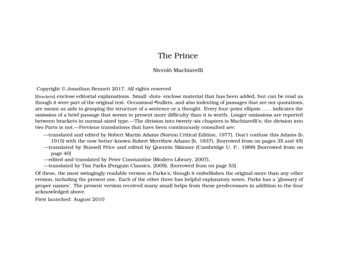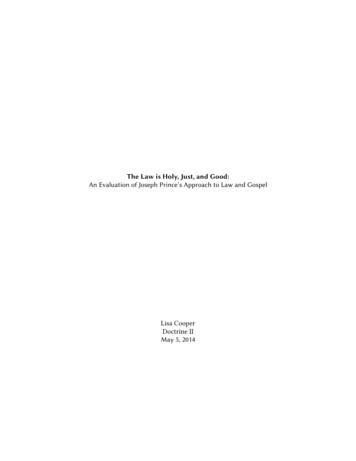
Transcription
The Law is Holy, Just, and Good:An Evaluation of Joseph Prince’s Approach to Law and GospelLisa CooperDoctrine IIMay 5, 2014
e Law is Holy, Just, and GoodLisa CooperIntroductionAs a new Christian, I had come to Jesus having already realized the desperate wickedness ofmy heart, feeling the weight of my sin against God and my neighbor, and knowing full-wellthat I deserved an eternity in Hell; this is precisely why the word of the true Gospel, thejustifying work of Jesus Christ on the cross for me, was so effective. In fact, through readingthe book of Luke, and studying the Nicene Creed, the truth of the good news changed my heartof stone into a heart of flesh. is good news came to me by no merit of my own, but only bythe grace of God through Jesus Christ. is very Gospel message is the foundation upon whichevery Christian church is built.Joseph Prince, the senior pastor of New Creation Church in Singapore, has quicklyrisen to pop-Evangelical stardom. With best-selling books such as e Power of Right Believing,and Unmerited Favor, Prince has become a national bestseller. He is a self-proclaimed “gospelpreacher,” due to his unconventional belief that through preaching only the Gospel (devoid ofthe Law), people will repent,1 they will make a decision for Jesus,2 and they will receive all ofthe benefits of being justified by Christ: forgiveness, health, prosperity, and dominion over allsin in this life. ese effects of the Gospel will then change the will of the believer, causingthem to live a holy life apart from the instruction of the law.Distinguishing, then, between Law and Gospel is imperative. In my case, the Gospelwas needed to mend the wounds of my Law-ravaged heart. However, there are manynonbelievers who are content in their sin, and need to first be shown their need for a saviorthrough the condemnation of the Law. One of the most well-articulated doctrines of the1 Prince defines the word “repent” when he writes, “[F]or all of you who feel that there should be morepreaching on repentance, do you know what the word ‘repent’ means in the first place? e word ‘repent’ is theGreek word matanoeo, which according to ayer’s Greek Lexicon, simply means ‘to change one’s mind.’ Butbecause we have been influenced by our denominational background as well as our own religious upbringing,many of us have the impression that repentance is something that involves mourning and sorrow. However, thatis not what the Word of God says. Repentance just means changing your mind.” Prince, Joseph. Destined to Reign: e Secret to Effortless Success, Wholeness, and Victorious Living. Tulsa, Oklahoma: Harrison House, 2007.2 “Jesus died for the whole world, but that does not mean that the whole world is automatically saved.Each individual must make a personal decision to receive Jesus as his Savior.” Prince, 137.2
e Law is Holy, Just, and GoodLisa CooperLutheran Church is the proper distinction between Law and Gospel. rough a Biblicalexploration of this doctrine, Joseph Prince’s errors are revealed. is paper deals exclusively with Prince’s Book entitled Destined to Reign and thetheological statements made therein. rough studying this book, Prince’s theological systemproves problematic in a number of ways: first, Prince’s view of Scripture promotes a falsedistinction between the Law and the Gospel based on the old and new covenants, rendering it afunctionally unsound hermeneutic; second, Prince only allows for one use of the law, whenthere are, in fact, three; and third, he cheapens the Gospel of forgiveness of sins by adding to iteffects that are not Biblical, such as health and prosperity. To correct these problems, it isimperative to look at what Scripture says regarding the proper distinction between Law andGospel, and to historic Lutheran writers who have wri en on the topic extensively for ourbenefit.Dividing Scripture into Law and Gospel e doctrine of Law and Gospel is foundational to all theology. All Christian theologicalsystems must account for the Law of Moses and the good news of Jesus Christ. e Law isdefined by Pieper in Volume ree of his Dogmatics as: “[T]he Word of God in which Goddemands of men that in their nature and in their thoughts, words, and acts they conform to thestandard of His commandments and pronounces the curse on those who fail to comply.”3 And,conversely, the Gospel is defined as: “[T]he Word of God in which God makes no moraldemands whatever on men, hence reproves no transgressions, but, on the contrary, promisesHis grace for the sake of Christ’s vicarious satisfaction to such as have not kept the divineLaw.”4 e doctrine of Law and Gospel seeks to divide the two without negation or conflation.3Pieper, Franz. Christian Dogmatics: Volume III. Saint Louis, Missouri: Concordia Publishing House, 1950,4Pieper, Vol. III, 222.222.3
e Law is Holy, Just, and GoodLisa CooperBoth must stand in Scripture. Without the condemnation of the Law, the Gospel is not freeing;without the whole, unbroken Law being necessary to obtain eternal life, Christ’s death on thecross would have accomplished nothing. Without the freedom obtained for us in the Gospel,the Law would still be binding, and we would suffer eternal separation from God because wecannot, of our own volition, keep the Law.Most problematic theological systems do not understand that Christ fulfilled the Law,rendering our efforts to merit salvation useless. In doing so, they purport some kind of holyliving as the means by which we obtain everlasting life with Jesus.5 e problem with Prince’stheology, however, is not this. He very clearly articulates the importance of faith in Christ asthe means by which we obtain everlasting life, and outrightly condemns any law-abiding asthe way to salvation. Prince articulates the Gospel clearly and concisely: “Jesus’ death hasfulfilled the righteous requirements of the law and of the old covenant. e Word of God tellsus that the ‘handwriting of requirements’ has been nailed to the cross. Jesus came to fulfill allthe requirements of the law on our behalf, so that the way to God is now opened. Hallelujah!”6He even explains, in less concise terms, the substitutionary atonement: “ e only reason Jesuscould cry out ‘It is finished!’ on the cross was that the full anger of God against sin had beentotally exhausted on His body. Jesus cannot lie! And if the anger of God has already beencompletely exhausted, how can God be angry with you today?”7 Prince very clearlyunderstands the Gospel message, and believes—rightly—that the Law cannot save us.85 is is common in the Roman Catholic church with their idea of “merit,” but there are, of course, manyother examples in contemporary Christianity. For example, in the Reformed tradition, Mark Jones has recentlycome out with statements that agree with the notion of law-abiding being necessary for salvation. For moreinformation on Mark Jones see his book entitled Antinomianism: Reformed eology’s Unwelcomed Guest.6Prince, 13.7Prince, 39.8To be clear, Prince’s formulation of how we receive the Gospel is problematic, and should be noted. Heclaims, “All of your sins—past, present, and future—have been washed clean by His precious blood. You arecompletely forgiven and from the moment you received Jesus into your life, you will never be held liable for yoursins ever again.” (Prince, 29). Oddly enough, by making salvation a decision, Prince makes obtaining salvation awork. It is obvious that Prince has been influenced by the Law-driven religion that promotes “making the rightdecision for Jesus.” e Gospel is free of conditions for Christians, Prince makes very clear, but we must first dothe receiving of Christ into our lives to make that a reality. Prince, then, unconsciously makes receiving theGospel into a man-made Law.4
e Law is Holy, Just, and GoodLisa CooperAlthough Prince does indeed understand the Gospel, the way he interprets Scripturethrough the lens of Law and Gospel reveals foundational issues with his theology. Fundamentalto any theological system is the hermeneutic used in drawing out meaning from a Biblical text.Rightly understanding a Biblical text in context is imperative to right theology. Instead ofseeking to draw out what the texts actually say in the context that the words appear in, Princestresses a Two Covenant system that must be applied to the Biblical texts,9 and claims that thisparticular framework is the only way to properly understand anything wri en in the Bible,including the words of Jesus. In contradistinction to this, a Lutheran approach seeks to drawout meaning based on the historical context, the grammatical uses of the original languages, allwhile using Scripture to interpret Scripture. e goal of the Lutheran approach is not to throwaway any passages, including what was fulfilled by Christ—namely, the Law—rather, the goal isto see the Law in its proper place, and to see the Gospel in all its glory. While Prince asserts aTwo Covenant scriptural interpretation that posits Law exclusively in the Old Testament andGospel exclusively in the New Testament, the Lutheran hermeneutic acknowledges Law andGospel as themes throughout all of Scripture.Prince’s Two Covenant ApproachPrince claims that the dividing line in Scripture is the cross of Jesus Christ; before it, theold covenant is strictly Law and is no longer applicable in the Christian life, and a er it, thenew covenant reveals only God’s love and mercy toward his people. Prince explains:God wants us to be able to rightly divide the Word. He wants us to be astute in rightlydividing and clearly separating what belongs to the old covenant of law and whatbelongs to the new covenant of grace. He wants us to be able to distinguish what9 e title “Two Covenant” system is my own, and does not appear in Prince’s writings. e term seeks todescribe the hermeneutic that Prince uses when he divides the Bible into two separate covenants.5
e Law is Holy, Just, and GoodLisa Cooperoccurred before the cross from what occurred a er the cross, and to understand whatdifference the cross made.10He delves into this distinction later in the book, by claiming that, “God Himself found faultwith the old covenant of law and the Ten Commandments.”11 e Law of God is therefore notan expression of the nature of God himself, but some sort of accident that God made. He goeson, “In other words, with the advent of the new covenant of grace, the Ten Commandmentshave been made obsolete.”12 By rendering the Ten Commandments obsolete, Prince does adisservice to the entirety of Scripture. He throws out the Scriptures prior to the cross as “law,”and retains the Scriptures a er the cross as consoling “Gospel.”13To put this Two Covenant hermeneutic into practice, Prince, in a larger context ofexplaining that God does not punish us for our sins in the new covenant, brings up King David.He references David’s punishment for his sin. As is wri en in 2 Samuel 12:11-14:[Nathan continued], “ us says the Lord, ‘Behold, I will raise up evil against you out ofyour own house. And I will take your wives before your eyes and give them to yourneighbor, and he shall lie with your wives in the sight of this sun. For you did itsecretly, but I will do this thing before all Israel and before the sun.’” David said toNathan, “I have sinned against the Lord.” And Nathan said to David, “ e Lord also hasput away your sin; you shall not die. Nevertheless, because by this deed you haveu erly scorned the Lord, the child who is born to you shall die.” (ESV)Prince answers the question: “But Pastor Prince, didn’t God punish King David for his sin and helost his child?” by writing, “Don’t forget that David, like Elijah, lived before the cross ofJesus. You will never find an example of God punishing a believer for his sins in the new10Prince, 51.11Prince, 121.12Prince, 122. Emphasis retained from primary text. e negation of the Ten Commandments in the lifeof the Christian and its effect on how Prince understands the Law is dealt with later in this paper in the sectionentitled “ e Uses of the Law.”13He does, however, at one point in the text (page 191) make the clarification that the whole of Scriptureis about Jesus, including the Old Testament. Although, he never says that the Gospel promises are for those wholived in Old Testament times; instead, he claims that all of Scripture points to Christ for us in present timesthroughout all of Scripture.6
e Law is Holy, Just, and GoodLisa Coopercovenant.”14 Instead of dealing with the text honestly, showing that God did indeed forgiveDavid of his sin, so much so, that David could, in fact, write the words, “Blessed is the man towhom the Lord shall not impute sin”15 about himself, Prince argues:Do you know who David was describing when he said, ‘Blessed is the man to whom theLord shall not impute sin?’ Since it’s clear that sin was imputed to David, he could nothave been describing himself as some scholars claim. No, he was looking propheticallyinto the covenant of grace. He was describing you and me — a new generation ofpeople who are under the covenant of grace!16Prince does not understand that while there can be temporal punishment for sin, there can beat the same time no eternal imputation of sin; the two can stand together withoutcontradiction. David, while righteous in the eyes of God, was no longer righteous in the eyes ofhis people. Temporally, God punished David for his sin because what he had done was atestimony against God in the eyes of the people. e text obviously explains a distinction, thatalthough there are earthly consequences for David’s sin, he is still forgiven by God. It istherefore clear that Prince is willing to sacrifice right Biblical interpretation in favor of ahermeneutic that makes every Gospel text in the Old Testament about believers in currenttimes, and not about the believers in the Old Testament.Along with confusing the deliverance of those in the Old Testament with those incurrent times,17 Prince goes even further with his distinction between the Law of the OldTestament and Gospel of the New Testament:14 Prince, 57. Emphasis retained from primary text. is is also not true. In Acts chapter 5, Ananias andSapphira are punished for “lying to God” (Acts 5:4) by keeping some of the proceeds from the selling of their land. ey aren’t simply punished temporally, they die (Acts 5:1-11). is is an even harsher punishment then Davidfaced. Another instance of Christians being punished in the New Testament is in Corinth where the Corinthianswere becoming sick and dying by taking the Lord’s Supper wrongly (1 Corinthians 11:27-32). To say that there areno cases in Scripture of people being punished in the new covenant is, simply put, wrong.15 “Romans 4:8 (King James Version).” In Bible Gateway, h p://www.biblegateway.com/passage/?search Romans 4%3A8&version KJV (accessed ursday, May 29, 2014).16Prince, 57.17 Although we would agree with Prince that the deliverance of those in the Old Testament shows ourfuture deliverance in Christ, we would say that this does not negate the actual saving of those in the OldTestament by belief in the promise of Christ.7
e Law is Holy, Just, and GoodLisa Cooper ere is a lot of confusion and wrong believing in the church today because manyChristians read their Bibles without rightly dividing the old and new covenants. eydon’t realize that even some of the words which Jesus spoke in the four gospels(Ma hew, Mark, Luke and John) are part of the old covenant. ey were spoken beforethe cross as He had not yet died. e new covenant only begins a er the cross, whenthe Holy Spirit was given on the day of Pentecost.18 is is to say that the words that came from Jesus’s own mouth may not be binding. isshould raise many red flags. If the words from Jesus Himself cannot be taken at face-value,how can we know exactly how to rightly understand the Scriptures? Prince explains that hecame to know this Two Covenant approach to Scripture alone—he received the revelationdirectly from God, he says—so, how can we trust that this is right when it is not self-evident inthe Biblical texts?19 e short answer: we cannot. Not only has Prince invented an approach toScripture that is not presented in the Biblical texts, he has proven to be willing to throw outkey passages that should be used for interpretation in favor of a Two Covenant hermeneuticthat essentially negates the larger half of the Bible.The Lutheran ApproachContrary to Prince’s incorrect Two Covenant approach to Scripture, Lutheran theology posits acorrect, and consequently much more nuanced hermeneutic. erefore, a full exposition of theLutheran approach to Scripture cannot be done within the confines of this paper.20 Instead, the18Prince, 92. Emphasis retained from primary text.19 Prince writes regarding his Christian upbringing on pages 61-62; 89-90; and 169. He also, on manyoccasions, cites his own personal revelation from God as the basis of his teachings. e Foreword to his bookbegins, “It all began in 1997, when I was on vacation with my wife Wendy en I distinctly heard the voice of theLord on the inside. It wasn’t a witness of the Spirit. It was a voice, and I heard God say this clearly to me: ‘Son,you are not preaching grace.’” Prince, vii.20 For more information regarding Lutheran hermeneutics, see Kuscke’s book entitled BiblicalInterpretation: e Only Right Way, or What Does is Mean?: Principles of Biblical Interpretation in a Post-ModernWorld by James W. Voelz.8
e Law is Holy, Just, and GoodLisa Coopergoal of this section is to give a brief overview in response to the particular issues presented inPrince’s approach.In contrast to Prince’s Two Covenant system, it is pertinent to note that Law andGospel are not divided between Old and New Testaments exclusively. e Gospel message isgiven as early as the proto evangel in Genesis 3:15, and the covenant that God makes withAbraham is exclusively Gospel as well.21 roughout the Old Testament, God continuallyshows mercy when He could have justifiably shown wrath. is is to say, the dividing linebetween Law and Gospel in understanding Scripture can be understood as such: the Law isthat which reveals our sin, it is that which we must do, and that which concerns us to obey,love, and honor God above all things, as in the Mosaic Law; the Gospel is that which concernsChrist’s suffering on our behalf, having fulfilled the commands of the Law perfectly, and thefree offer of righteousness that is not our own. e Law demands our merit, while the Gospel isentirely unmerited. We cannot draw a hard line at the cross, rendering the former portion ofScripture moot; instead, we should seek to place each individual passage in context to evaluatewhether the text portrays the Law or the Gospel. Walther, in his extensive treatment of thedoctrines of Law and Gospel writes, “Nor is this the difference [between the doctrines], thatonly the Gospel is necessary, not the Law, as if the la er were a mere addition that could bedispensed with in a strait. No, both are equally necessary. Without the Law, the Gospel is notunderstood; without the Gospel the Law benefits us nothing.”22 is is most certainly true. Hegoes on to say, “[T]here are Gospel contents in the Old and Law contents in the NewTestament.”23 is is directly opposed to the arguments that Prince makes regarding rightlydividing Law and Gospel in Scripture.In addition to this, we must take into account the historical and grammatical contextsof passages while reading the Bible, and clear Scripture should always interpret unclear21Genesis 15.22Walther, C. F. W. Trans. W. H. T. Dau. e Proper Distinction Between Law and Gospel. Saint Louis,Missouri: Concordia Publishing House, 1986, 6.23Walther, 7.9
e Law is Holy, Just, and GoodLisa CooperScripture. e Bible does not contradict itself, neither does it negate itself. is is another placewhere Prince’s Two Covenant approach falls extremely short. He, as stated in the abovesection, shows that words from Jesus’s own mouth are not binding on believers because theyportray the Law of the Old Testament. Rather than take Jesus at his word, Prince seeks to ripGod’s Word out of context to suit his own agenda.24 It is important to note: “While the Law andthe Gospel must be carefully distinguished, as two portions of the one Word of God, they arenot contradictory. e one is only preparatory to the other. Everyone who inherits everlastinglife does so through the fulfillment of the Law.”25 is fulfillment of the Law is not by our owndoing, but by Christ’s vicarious satisfaction on the cross.The Uses of the LawIn Lutheranism, there is posited a threefold use of the Law. e first use of the law is the civiluse; the second is to reveal our sin and need for a savior; the third is to instruct the Christian inholiness.26 Although the second use is primary, the other two uses are retained because theyare important and because they are made clear in Scripture. Joseph Prince does a great24 Prince has a habit of citing Greek words out of context as well. He does this by saying that the Bible isnormally translated a certain way, but every translator is wrong because the real meaning of the word is thealternate dictionary definition (see footnote 1 concerning the word ‘repent’ for example). He does not cite anyscholarship to prove these assertions, but instead simply claims it. He goes as far as to say that the editors of theNew King James Bible added text for theological reasons, when the text he cites is, in fact, a textual variant. “ equestion we should be asking is, ‘Did Jesus tell us to fast?’ Now, I know that when Jesus’ disciples were unable tocast out a certain spirit from a boy, the NKJV (as well as the KJV) Bible does record that Jesus, in reference to thespirit, said, ‘ is kind can come out by nothing but prayer and fasting.’ So people have read this one verse andconcluded that the secret to spiritual power is fasting. But do you know that in the original Greek text, the word‘fasting’ does not appear in that verse? It was added by the translators!” page 275. is particular method ofargumentation has caused deep unrest in some laypeople that I know who have read this book; one woman inparticular has been terrified to read any translations of the Bible because she thinks translators are lying to her bynegating and adding certain words to the Biblical texts.25Jacobs, Henry Eyster. Ed. Jordan Cooper. Elements of Religion. Fairfield, Iowa: Just and SinnerPublications, 2013, 151.26 e third use of the law is dealt with later in the paper concerning Christian living under the heading“ e Effects of the Gospel.” It should be noted that Prince does not allow for the first use of the Law in his book,but the discussion concerning the first use is not directly pertinent to the content of the book, nor the goal of theargument made in this paper, so I have le this discussion out.10
e Law is Holy, Just, and GoodLisa Cooperdisservice to all those who read Destined to Reign by maintaining that the only function of thelaw is to condemn prior to conversion, and a er conversion, the law has no use whatsoever.A reoccurring theme with Prince is: “[T]he law is holy, just and good But even thoughthe law is holy, just and good, it has no power to make you holy, just and good. You see, thelaw was designed to expose your weaknesses, your sins, and your inability to be holy, just andgood.”27 is is exactly right. Romans 3:10 explains the depth of our sin, “None is righteous, no,not one; no one understands; no one seeks for God. All have turned aside; together they havebecome worthless; no one does good, not even one” (ESV). We also know that the Law has nopower to make us right with God, it is only by grace through faith.28In conjunction with Prince’s assertion that the Law only condemns, he also, and morejarringly, contends that the Law only condemns non-Christians. is is key to Prince’stheology. Once a person is converted, and because there is “therefore now no condemnationfor those who are in Christ Jesus,” (Rom 8:1 ESV) there is, for Prince, no place for the seconduse of the Law in the Christian life. In fact, he posits that feelings of condemnation in theChristian life actually bring about suffering; this is not because God punishes us for notfollowing his commands, but because by focusing on our sin, we do not trust God’s promisesenough. Prince explains that we should not even be so aware of our sins as to confess thembefore God:Beloved, confessing your sins all the time will only make you more sin-conscious. Butknowing that you are under Jesus’ waterfall of forgiveness will keep your forgivenessconscious. And knowing that you are forgiven of all your sins will give you the power27Prince, 16.28“But God, being rich in mercy, because of the great love with which he loved us, even when we weredead in our trespasses, made us alive together with Christ—by grace you have been saved—and raised us up withhim and seated us with him in the heavenly places in Christ Jesus, so that in the coming ages he might show theimmeasurable riches of his grace in kindness toward us in Christ Jesus. For by grace you have been saved throughfaith. And this is not your own doing; it is the gi of God, not a result of works, so that no one may boast” (Eph.2:4-9).11
e Law is Holy, Just, and GoodLisa Cooperto reign over every destructive habit and live a life of victory!29Later in his book, Prince explains a diagram of a plant.30 In this picture, there is a plant abovethe soil with leaves labeled: “sickness,” “destructive habits,” and “financial lack.” Under the soil,there is an even larger root system. ese roots are labeled: “stress,” and “fear,” with the deepestroot called “condemnation.” is picture symbolizes Prince’s ideas about focusing on sin in anycapacity in the Christian life. e Christian should therefore never feel any condemnation forhis sin, even if it points him to Christ, because condemnation is only meant for unbelievers.Condemnation in the Christian life therefore brings about suffering by way of sickness,destructive habits, and financial lack.Although Prince understands the impossibility of fulfilling the Law, and is correct inasserting that we are powerless to fulfill it without the righteousness of Christ imputed to us,he goes too far and makes the Law the tool of the devil exclusively. In Scripture, the Devil iscalled the “accuser,” and for good reason. e Devil does use the Law to show us our sin and tomake us doubt our standing with God. However, Prince goes a too far by saying: e bo om line is that the Holy Spirit never convicts out of your sins. He NEVERcomes to point out your faults. I challenge you to find a scripture in the Bible that tellsyou that the Holy Spirit has come to convict you of your sins many believers don’tunderstand that the Holy Spirit is actually in them to convict them of theirrighteousness in Christ.31Scripture is clear that the Holy Spirit does, in fact, convict us of our sins. John 16:8-11 states:“And when [the Holy Spirit] comes, he will convict the wold concerning sin and righteousnessand judgement: concerning sin, because they do not believe in me; concerning righteousness,because I got to the Father, and you will see me no longer; concerning judgement, because theruler of this world is judged” (ESV). It is also true that the Word of God convicts of sin as well,29Prince, 109.30Prince, 131. is particular illustration, he claims was direct revelation from God.31Prince 134-135. Emphasis retained from primary text.12
e Law is Holy, Just, and GoodLisa Cooperand the Bible was inspired by the Holy Spirit: “All Scripture is breathed out by God andprofitable for teaching, for reproof, for correction, and for training in righteousness, that theman of God may be competent, equipped for every good work” (2 Tim. 3:16, ESV). is isimportant because it gives us clear reason to believe that the law is beneficial for Christians inboth the second use—showing us our sin—and in the third use, so that we can be instructed inChristian living. If the Law is reduced to being a tool of the devil exclusively, there is no roomfor a right use of the Law in growing in holiness as a Christian.Contrary to Prince’s Lawless Christianity, Walther explains that the Law is, in fact,necessary in the Christian life, and to throw away either Law or Gospel for the Christianwould render the person a nonbeliever: “Even for the Christian the Law still retains itssignificance. Indeed, when a person ceases to employ either of these two doctrines, he is nolonger a true Christian.”32The Effects of the Gospel e primary effect of the Gospel is the forgiveness of sins. Justification by faith alone in Christalone accomplishes this perfectly, without any contribution of holiness on the part of thebeliever. G. H. Gerberding, in his book e Way of Salvation in the Lutheran Church describesthe effects of the Gospel when he writes: “By [Christ’s] death or suffering obedience, Heworked out a negative righteousness, the forgiveness of sins. By his life, or active obedience,He won a positive righteousness. e former releases from punishment. e la er conferscharacter, standing and honor in the kingdom of God.”33 Not only, then, have we received theforgiveness of sins, but we have also been adopted as sons. We have been granted an esteemedstanding before God on account of Christ. e faith that justifies us does so not because it is32Walther, 7.33Gerberding, G. H. Ed. Jordan Cooper. e Way of Salvation in the Lutheran Church. Fairfield, Iowa: Justand Sinner Publications, 2013. 142.!13
e Law is Holy, Just, and GoodLisa Cooper“an act that merits or earns justification. No! In no sense. Christ has earned it. Faith only layshold of and appropriates Christ and a ‘gi of God,’ as the Scriptures declare.”34 is particulartruth of the Gospel is articulated by Prince in a concise, orthodox way. He makes it very clearthat there is nothing a person can do to merit salvation. He therefore understands the n
Joseph Prince, the senior pastor of New Creation Church in Singapore, has quickly risen to pop-Evangelical stardom. With best-selling books such as e Power of Right Believing, and Unmerited Favor, Prince has becom
